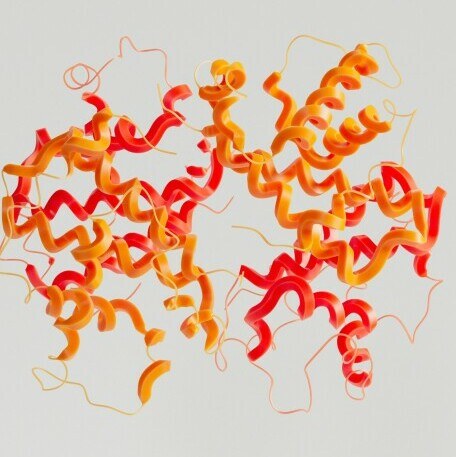
What is collagen?
Collagen is everywhere in skincare these day, and its reputation as a cornerstone of anti-aging regimes is well-deserved. As the most abundant protein in your body, (around 30% of your body’s total protein), collagen is the key structural component in your skin, tendons, and connective tissues. This is why babies and children have such beautiful, bouncy, elastic skin, as they have so much beautiful collagen!
With the beauty and wellness industries shouting loud about the benefits of collagen, you might be wondering if it’s vegan-friendly. It absolutely isn’t.
Most of the collagen-containing creams and supplements on the market are made from the skin and tendons of farm animals and marine life.
However, that doesn’t mean that you are destined to age gracefully, while everyone else retains youthful, healthy, collagen-plumped skin. Read on to find out more.
Collagen is a protein. Like all proteins, it is comprised of amino acids, namely, proline and glycine and hydroxyproline, in a triple helix structure.
Unfortunately, the body’s natural collagen starts to decline as we age. From as early as our mid-twenties, collagen stores begin to be depleted, at a rate estimated to be around 1% a year. By age 40, collagen production drops dramatically, leading to wrinkles and thinner, sagging, and drier skin.
There are around 28 different types of collagen in our bodies, but types 1, 2, 3, 4, 5 and 7 are the real VIPs when it comes to skin. Type 1 is like the kingpin of skin collagen, making up the lion’s share of skin’s structure, – around 90% of the collagen in your body and the most densely packed. Type 4 is its trusted ally, found right alongside in your skin’s layers. Meanwhile, type 5 is found in the eyes and in some layers of skin and hair and type 7 plays a supporting role, anchoring all these other types to one another.
Still, that’s a lot of types of collagen to be protecting and encouraging formation of!
Of course, we all know that smoking depletes collagen faster, but everyday factors such as UV exposure from the sun and pollution from vehicles, factories and other environmental factors do significant damage too! Hormones are another formidable enemy, – following menopause and the resulting decline in oestrogen, both collagen stores and production take a huge hit!
Collagen’s job is not just superficial – it’s about structural support. It provides a foundation that upholds skin’s strength and elasticity, which is essential for skin that looks and feels youthful. Anyone interested in skincare should know that supporting collagen levels is an investment in their skin’s long-term appearance and health.
So when it comes to keeping your skin as youthful as possible and resilient against wrinkles, collagen is the number one factor. What could be more fundamental than maintaining the scaffolding that keeps our skin firm and elastic?
Now, looking at the building blocks that sustain collagen production, it’s essential to recognize the role of specific nutrients. Vitamins such as A, C, and E, along with minerals like zinc, copper, and manganese, don’t just support overall health; they are essential to the synthesis and maintenance of collagen. Keep reading to find out how these nutrients work and why they’re so important for your anti-aging skincare routine.

Nutritional Building Blocks of Collagen Production
Your body creates collagen, but the process isn’t autonomous. It demands specific nutrients in order to be efficient. I’ll walk you through how vitamins A, C, E, and certain minerals and amino acids are crucial for collagen synthesis, which in turn is vital for maintaining the skin’s youthful resilience.
Vitamin A stimulates fibroblasts, the cells responsible for developing tissue that keeps skin firm and healthy. If your diet lacks this nutrient, you might notice that your skin doesn’t have the robustness it once did. Think of vitamin A as a contractor who prompts the builders (your cells) to get to work on reinforcing the structure of your home (your skin).
Vitamin C is a key player, not just for your immune system but also in collagen production. It’s a required component for the biosynthesis of collagen, like a catalyst in a pivotal chemical reaction. Without vitamin C, collagen production slows, and this can lead to weaker skin and, ultimately, more pronounced signs of aging. You’ll find both Vitamins A and C in many, many anti-aging products for precisely this reason.
Enter vitamin E. While not directly involved in collagen synthesis, it supports the process by fighting against the oxidative stress that can otherwise degrade collagen fibres. It’s the dependable guardian that helps your skin’s collagen stand the test of time.
Zinc is a mineral that’s often overlooked in skincare, yet it plays an essential role in collagen production. It acts by aiding in the synthesis process and by helping to prevent the breakdown of collagen. You can see zinc as a sort of quality control supervisor, ensuring that collagen is not only produced but also maintained properly.
Vitamin C, zinc, copper and manganese are necessary to form the triple helix structure of collagen proteins.
Lysine, an amino acid, is fundamental in collagen’s structure because it’s one of the main building blocks. It’s necessary for the formation of collagen’s helical structure. Absence of lysine is akin to missing a crucial piece in a complex puzzle. And you may know that Lysine is the key amino acid that can be deficient in a vegan diet. (Not that it’s difficult to obtain of course, – you just need to ensure you include foods such as lentils and other legumes, soybeans, black beans, navy beans, tempeh and nuts in your diet).
Finally, there’s biotin and peptides. Biotin, often hailed for its benefits for hair and nails, also affects the skin, although its role in collagen production isn’t fully understood. Peptides, on the other hand, are fragments of proteins that can signal your body to produce more collagen. They are like coaches encouraging a team to step up their game.
Of course, it goes without saying that you should ensure you consume the amino acids that collagen is made of! Sources of proline and glycine include lentils and legumes, cabbage, asparagus, mushrooms, nuts, spinach, tofu, peas and kidney beans.
Sources of Collagen: Understanding the Options
Collagen supplements in the form of powders and pills, as well as collagen peptides in face creams, are now everywhere in the skincare and beauty industries. Knowing the source of your collagen supplements is crucial as the great majority of them are derived from animal tissues, such as cow and pig skin, which naturally possess high concentrations of the protein, and marine collagen, from fish skin and bones, by-catch and other sea creatures.
But of course, these are an absolute no-go for vegans.
The body’s natural production of collagen of all types declines as we age, many outside factors over which we have little, if any, control abound, and the collagen supplements that everyone’s raving about are not an option for us.
So, what’s a vegan to do?
If you’re vegan or simply exploring ethical alternatives, you may wonder about plant-based options.
Do plants even produce collagen?
You may have seen marketing advertising products as having ‘plant-based collagen’, or ”collagen from plants” etc. But this really is only marketing.
Plants do NOT produce collagen. The specific amino acid combination required for the various types of collagen are only found within animal tissues and bones.
The good news is that advancements in science and a growing demand for vegan products have led to the development of plant-based collagen supplements.
But what exactly goes into vegan collagen supplements and are they really a viable alternative?

Vegan Collagen Supplements: An Ethical Alternative
If you’re committed to a vegan lifestyle, it’s natural to seek out skincare options that align with your values. Vegan collagen supplements have emerged as a kind and conscious option for individuals aiming to maintain their skin’s youthfulness without compromising on ethical standards.
A common concern is whether plant-based sources can truly offer the same benefits as their animal counterparts. Detailed ingredient profiles in vegan supplements seek to answer this, aiming to deliver comparable results.
You may wonder, what exactly goes into these vegan collagen alternatives?
Primarily, these supplements are crafted from genetically modified yeast and bacteria. Scientists have figured out a way to recreate collagen genes in a lab, resulting in a product that mimics the amino acid structure of traditional collagen.
The market offers a diverse array of vegan collagen supplements. Ingredients like vitamin C and various amino acids are often included in order to boost the body’s natural collagen production. Some brands even infuse their formulas with plant extracts that are rich in antioxidants which may support skin health.
One widespread myth is that vegan collagen is not as potent or effective as animal-sourced collagen. Yet, as the field of plant-based wellness continues to evolve, more innovative and sophisticated solutions are debunking this claim. As mentioned previously, collagen is a protein, and no protein is absorbed and used by the body ‘as-is’. Eating collagen-rich (read, ‘animal’) foods does not directly result in increased collagen levels in your body. ALL consumed proteins are broken down during digestion into their composite amino acids, which the body then utilises to create the proteins it sees fit, and this process, (as of yet, at least) cannot be directed either. This is just as true of animal-based collagen supplements or sources as it is those supplements that use plant-based sources for their ingredients.
Vegan collagen now stands as a promising rival in the world of anti-aging skincare, backed by evolving science and technologies.
Evaluating the Effectiveness of Vegan Collagen in Skincare
As we’ve seen, the truth is, the science behind vegan collagen is promising, with studies indicating plant-based ingredients can stimulate the body’s own collagen production.
People have reported improvements in skin elasticity and hydration after incorporating vegan collagen into their routine. While individual results vary, these supplements are gaining a reputation for helping people achieve a more youthful appearance.
Experts highlight the importance of consistency and proper usage. Like with any skincare product, vegan collagen supplements are part of a broader regimen. They should be coupled with a healthy lifestyle, adequate sun protection and sleep, and appropriate skincare routines to truly make a difference.
In considering whether to add vegan collagen to your anti-aging arsenal, keep in mind that no supplement is a magic solution. However, if your goal is to support your skin’s health ethically and sustainably, vegan collagen supplements offer a conceivable option. As science advances and more people share their experiences, we’re likely to understand even better how these supplements fit into effective skincare.


